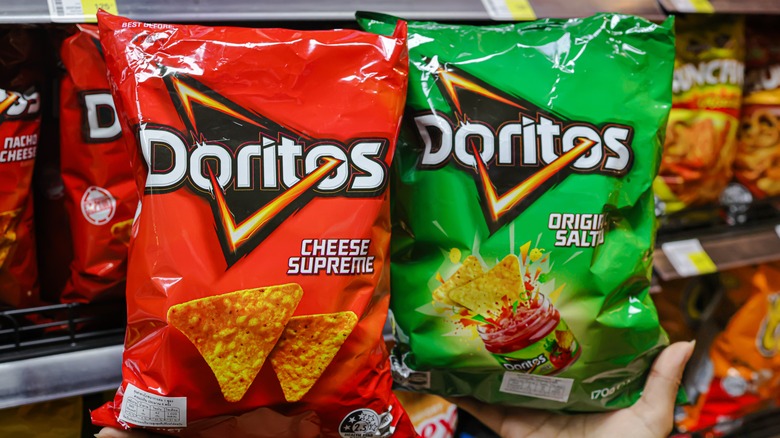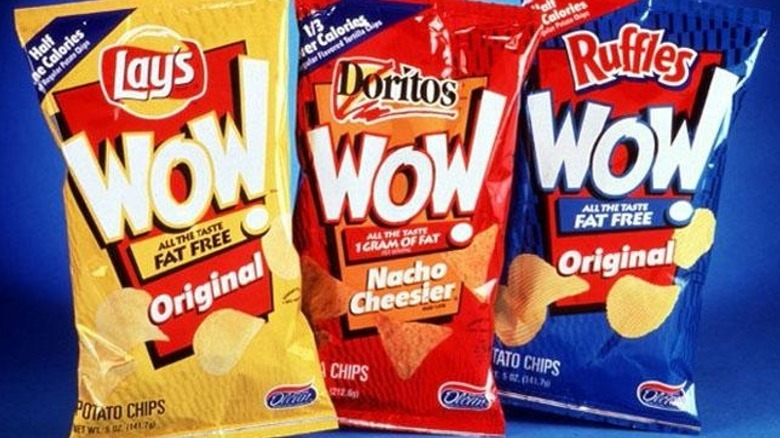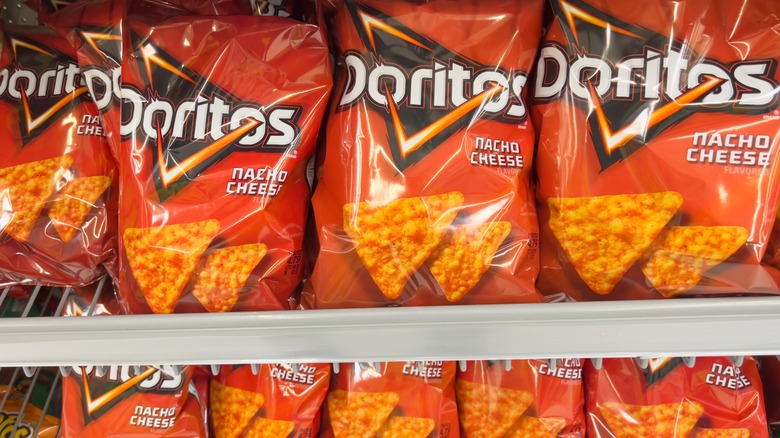Does Anyone Remember Doritos Light (And Why They Are Banned)?
If you were asked what Doritos are, you'd most likely be able to answer without thinking. Doritos are those triangular tortilla chips that are covered in a flavoring powder and they come in a wide range of flavors, ranging from Cool Ranch to Nacho Cheese to Flamin' Hot Lime. With over 6.65 million Americans consuming 8 or more bags of the dust-covered chips in 2020 alone (per Statista), it's clear that Doritos are a beloved and widely popular snack.
But, back in those wild anything-goes days of the 1990s, the good people at Frito-Lay decided to shake things up with Doritos, perhaps try to tap into a new market that extended beyond the usual snack food demographic. What if, Frito-Lay executives wondered, we could sell Doritos as a health food? This was the '90s after all — a time when ketchup could be purple, french fries came in the shape of a smiling face, and chicken nuggets were shaped like dinosaurs. To market Doritos as a low-fat "healthy" alternative wouldn't be too wild.
It was during that time Frito-Lay introduced its "WOW!" brand of chips, which were the chain's popular brands like Lay's, Ruffles, and Doritos but marketed as "fat-free." The "WOW!" line of chips promised all the flavor of the usual chips and only one gram of fat, all thanks to a special ingredient known as Olestra. But these healthier chips would soon have customers saying "Wow!" for a very different– and far more disgusting– reason.
Olestra caused severe digestive problems in the consumer
What made Frito-Lay's line of fat-free chips unique is something called Olestra. On paper, Olestra sounds incredibly appealing– not only does the molecule give foods that fatty, delicious taste, but it was also large enough to not be digested through the body. Instead, the molecule would simply move right through the digestive tract. The idea that you could eat as much Doritos or Lays as you want and not worry about building up fat sounded good– too good, in fact, as Olestra's unique ability to slide quickly through the digestive system meant that it operated in the same way a laxative does.
Now, if someone were to eat handfuls of chips that couldn't be digested and instead raced through your digestive system, it doesn't take a lot of guessing to figure out what the end result will be. In 1997, the Center for Science in the Public Interest was forced to do a press release regarding Olestra, as call after call from hundreds of snack-eaters flooded their hotlines. All the calls revolved around consumers suffering from "abdominal cramping, diarrhea, fecal incontinence, and other gastrointestinal symptoms"– all stemming from consuming Frito-Lay's "WOW" chips, including its Doritos line.
As reports of people getting violently sick or suffering from bathroom issues circulated through the years, Frito-Lay reportedly tried to solve the problem by re-introducing vitamins to the chips, but in the end, the chips had already left a lasting legacy on the public.
Olestra has been banned for its adverse health effects
It would seem that Olestra worked too well– after all, if you can't keep your food inside of you, that means you're fat-free, right? While Frito-Lay may have been banking on the supposedly healthy properties of Olestra to bring in the money, the company found itself forced to warn customers that consuming foods cooked in Olestra could "cause loose stools and cramping." Certainly a warning no customer wants to hear when they're looking for fat-free chips.
Today, Olestra and any products fried in it such as Doritos Light, remain banned in several countries, such as parts of Europe and Canada. Frito-Lay was forced to abandon its practice of cooking with Olestra, instead focusing on more conventional methods of selling healthy chips, such as Baked Lays, for example. Many people look back on Frito-Lay's "WOW!" line of chips as a humorous footnote in the history of the 1990s.
Olestra, however, isn't all that bad. A 1996 report by Deseret News explains that Olestra's benefits are clear, but how it is used in the food industry makes it unsuitable for consuming large amounts of. Instead, the article advises readers to avoid looking to snack foods when losing weight and instead change to a healthier, more natural diet.


